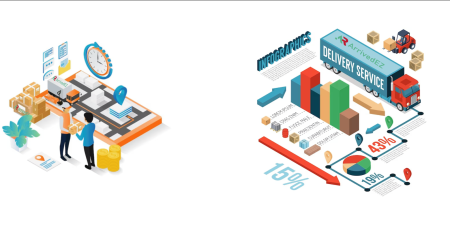Cooperation between medical couriers and healthcare facilities is an important factor in improving both the efficiency of healthcare delivery and the quality of treatment provided to patients.
Arrived EZ2024-02-04T18:04:07+00:00In the ever-changing healthcare industry, the smooth cooperation between medical couriers and healthcare institutions is crucial for the efficient and prompt transportation of medical supplies, specimens, and equipment. This synergy enhances both operational procedures and patient care standards. This blog explores the importance of cooperation in healthcare delivery and the potential for improved results via the relationship between medical couriers and healthcare institutions.
The Importance of Collaboration in Healthcare Delivery:
The effective provision of healthcare services relies heavily on the seamless and synchronized operation of many components within the healthcare ecosystem. An essential factor that significantly influences this process is the cooperation between medical couriers and healthcare institutions. This collaboration is crucial for tackling several obstacles related to the transportation of medical items, encompassing supply chain administration, specimen conveyance, and the distribution of medical equipment.
Logistics and operations management:
Medical couriers are necessary for guaranteeing the punctual and precise delivery of drugs, medical supplies, and other vital goods to healthcare institutions. Ensuring that healthcare practitioners have access to the essential resources to offer excellent patient care is crucial, especially in minimizing stock outs.
Temperature-sensitive items, such as vaccinations or certain pharmaceuticals, may need specific temperature conditions to maintain their effectiveness. Specialized medical couriers can guarantee the transportation of these materials under the necessary circumstances, preserving their effectiveness and purity.
Transportation of Samples:
Rapid and Reliable Transportation: The conveyance of medical specimens, such as blood samples or tissues, is subject to strict time constraints. Medical couriers have the necessary skills and resources to handle these fragile products with care, guaranteeing their prompt and safe transportation between different locations. Timely receipt of test findings is crucial for diagnostic reasons, enabling healthcare practitioners to swiftly access them.
Distribution of medical equipment:
Streamlined Deployment: Medical institutions often need the swift distribution and implementation of diverse medical equipment. This encompasses a wide range of equipment, ranging from diagnostic apparatus to gadgets used for monitoring patients. By partnering with medical couriers, the timely delivery of these essential instruments is guaranteed, hence enhancing the smooth functioning of healthcare establishments.
Crises:
Swift action is necessary in emergency circumstances or during crises, as the timely transportation of medical supplies, equipment, and specimens becomes even more vital. The partnership between medical couriers and healthcare institutions facilitates an expedited response mechanism, enabling healthcare practitioners to promptly treat critical circumstances with the necessary resources available to them.
Cost effectiveness:
Specialist Services: Healthcare institutions may achieve greater cost-effectiveness by outsourcing transportation services to specialist medical couriers. These couriers possess the specialized knowledge and well-developed systems necessary to properly handle medical commodities, so enabling healthcare practitioners to concentrate on their primary duties without the additional task of handling intricate logistics.

Ultimately, the collaboration between medical couriers and healthcare institutions is essential for establishing a streamlined and proficient healthcare delivery system. It not only tackles logistical obstacles but also guarantees that healthcare practitioners may concentrate on their main objective of providing exceptional patient care. This partnership enhances the overall ability of the healthcare system to withstand and adapt to challenges, especially during periods of heightened demand or emergency.
Advantages of Collaboration:
Prompt and Protected Specimen Transportation:
Medical couriers play a vital role in assuring the secure and timely transportation of specimens from healthcare institutions to labs, which is essential for supporting fast diagnosis and treatment planning. The efficacy of healthcare services is influenced by many essential components:
Punctual and Effective Transportation:
Medical couriers are experts in the rapid and safe transportation of diverse medical specimens, such as blood samples, tissues, and other diagnostic materials. Promptness is crucial, especially in the context of diagnostic testing, since timely delivery enables labs to start analysis soon, resulting in expedited outcomes.
Ensuring the integrity of specimens is maintained:
Preserving the integrity of specimens is crucial for ensuring precise diagnostic results. Medical couriers use sophisticated packing and handling protocols to safeguard specimens against environmental variables such as temperature variations, vibrations, and contact with impurities. This ensures the preservation of the samples’ quality throughout transportation.
Compliance with Transportation Regulations:
Medical couriers must adhere to transportation standards and norms established by healthcare authorities. Adherence to these rules is crucial to ensure the safety and dependability of the specimens throughout transit. This encompasses the correct identification, record-keeping, and strict compliance with designated protocols for various specimen categories.
Risk mitigation for contamination and deterioration:
Adhering strictly to transportation guidelines reduces the likelihood of specimen contamination or degradation while in transit. Couriers are instructed in the proper handling of specimens, using suitable containers and packing to avoid any leakage or spillage. The meticulous focus on every aspect ensures the specimens remain stable and viable until they arrive at the laboratory.

Courier-Specific Training:
Medical couriers often get specific training to ensure the safe handling of medical specimens. This course covers the correct identification of specimens, techniques for handling them, and protocols for responding to emergencies. Couriers are prepared to handle any unexpected obstacles that may occur during transportation, guaranteeing that the specimens maintain their viability for precise testing.
Systems for communication and tracking:
Medical couriers often use sophisticated communication and tracking systems to improve openness and accountability. Healthcare institutions and labs may track the real-time status and location of specimens with this technology. If there are any delays or problems, immediate notification ensures that appropriate actions may be done to minimize such interruptions.
Quality of customer service and promptness in addressing customer needs:
Medical couriers place a high importance on providing excellent customer service and being prompt in their responses. Establishing efficient communication channels among couriers, healthcare institutions, and labs facilitates the resolution of any complaints or specific needs. This cooperative approach guarantees the seamless execution of the whole procedure, enabling healthcare practitioners to depend on prompt and precise diagnostic outcomes.
To summarize, the careful management and delivery of specimens by medical couriers play a crucial role in the healthcare system. Their adherence to rules, use of specialist training, and implementation of modern tracking systems guarantee the secure and effective transportation of specimens. Consequently, this aids healthcare practitioners in promptly diagnosing patients and formulating suitable treatment strategies.
Efficient Supply Chain Management:
The partnership between healthcare institutions and their supply chain counterparts, such as medical couriers and suppliers, is crucial in optimizing the supply chain process. This partnership offers several advantages that improve productivity and mitigate the danger of disruptions:
Live tracking and monitoring:
Collaboration facilitates the deployment of live tracking and monitoring systems for medical supplies during transportation. Healthcare institutions may use modern technology and communication platforms to monitor the transit of goods from their source to their delivery location. The ability to see current information immediately helps in predicting the timing of deliveries, enabling more effective scheduling and minimizing the possibility of inventory shortages or delays.
Proactive inventory management:
Healthcare institutions may use a proactive inventory management strategy by using real-time monitoring data. Healthcare managers may make well-informed choices about the timing of delivery and the effective allocation of resources by having precise knowledge of the location and condition of incoming supplies. This facilitates the maintenance of ideal stock levels to fulfill demand and prevent avoidable shortages or excess situations.
Risk mitigation refers to the process of reducing or minimizing potential risks or negative impacts.
Real-time monitoring of the supply chain enables prompt detection of possible faults or interruptions. Healthcare institutions have the ability to take pre-emptive measures in order to limit risks, whether it be in response to transportation delays or a sudden surge in demand. Adopting a proactive approach is particularly crucial in avoiding shortages of vital medical supplies and guaranteeing seamless and uninterrupted patient care.
Enhanced Interpersonal Interaction:
Collaboration necessitates the establishment of efficient communication channels between healthcare institutions and their supply chain partners. Regular and prompt notifications on stock availability, shipment timetables, and unexpected obstacles facilitate improved synchronization. The establishment of this transparent channel of communication promotes a cooperative atmosphere, facilitating prompt resolution of issues and adaptations to guarantee the seamless distribution of medical resources.
Minimized Administrative Workload:
Integrated automated solutions streamline the cooperation process and alleviate the administrative workload on healthcare personnel. Automated solutions may replace the need for human inventory monitoring and management by providing real-time updates and notifications. This enables healthcare workers to prioritize patient care and strategic decision-making instead of being burdened by monotonous administrative duties.
Enhanced Inventory Management and Minimized Excess:
The combination of collaboration and automated tools enables the use of data to make informed decisions in inventory management. Healthcare institutions may enhance their supply levels by assessing historical data, consumption trends, and real-time demand. Such accuracy aids in waste reduction by preventing excessive inventory or expiry of medical supplies, hence promoting cost-effectiveness and sustainability.
Optimal allocation of resources:
Timely data on supply chain dynamics enables healthcare institutions to optimize resource allocation. This encompasses not just medical supplies but also personnel. By gaining a more precise comprehension of the anticipated arrival time of goods, healthcare managers may strategically adjust staffing levels to efficiently manage the incoming inventory. This ensures that the appropriate individuals are present to receive, examine, and distribute the supplies.
To summarize, the integration of real-time monitoring and automated technology in the healthcare supply chain fosters a more efficient and responsive system via cooperation. This strategy aids healthcare establishments in maintaining ideal inventory levels, reducing the risk of shortages, and improving overall resource allocation. Consequently, healthcare personnel may concentrate on providing high-quality patient care without being interrupted by insufficient or excessive supplies.
Enhanced Patient Care and Enhanced Patient Experience:
Efficient coordination between healthcare institutions and their supply chain partners enables the speedier delivery of crucial medical supplies and equipment, which has substantial consequences for emergency response and overall patient outcomes. This partnership enhances the efficiency of emergency response, hence improving patient care by reducing response times.
Prompt Emergency Response:
During crises, the promptness of actions is crucial. Effective teamwork guarantees the quick delivery of crucial medical supplies and equipment, including life-saving drugs, trauma equipment, and specialized gadgets, to healthcare institutions. A prompt reaction is essential in stabilizing patients and commencing appropriate therapies, eventually enhancing the likelihood of favorable outcomes.
Minimized Treatment Delays:
Expediting the transportation of medical supplies and equipment reduces the occurrence of treatment delays. Prompt access to vital resources enables healthcare practitioners to promptly implement treatment procedures without avoidable delays, whether in response to a mass casualty incident, a natural catastrophe, or an increase in patients during a public health emergency. This is especially crucial in time-sensitive scenarios, such as cardiac crises or severe trauma, when each minute is of utmost importance.
Improved readiness for sudden increases in demand:
Effective teamwork guarantees that healthcare institutions are more equipped to manage increases in demand during crises. Efficient supply chain operations enable institutions to rapidly expand their resources in order to fulfil the growing demands of patients. The capacity to adapt is essential for sustaining a superior level of care, especially in difficult situations.
Enhanced Patient Results:
Enhanced reaction times and minimized treatment delays have a direct impact on enhancing patient outcomes. Timely access to appropriate resources may greatly impact the recovery and survival rates of patients, whether it involves giving life-saving drugs, conducting emergency surgeries, or providing critical care treatments.
Reduced Interruptions in Healthcare Services:
Effective teamwork mitigates interruptions in healthcare services during crises. To maintain seamless operations, healthcare institutions must provide a consistent and dependable supply of medical supplies, especially when confronted with unforeseen obstacles. This resilience is crucial for sustaining vital healthcare services and avoiding avoidable burdens for patients.
Improved Patient Contentment:
Prompt access to medical supplies and equipment enhances the overall patient experience. Patients and their families feel more confident when they see that healthcare practitioners possess easily accessible resources to meet their requirements. Such a high degree of readiness and ability to quickly react improves the overall level of contentment among patients, hence promoting confidence in the healthcare system.
Establishing Confidence in Healthcare Systems:
Reliable and effective cooperation fosters confidence in healthcare systems. The demonstration of a well-coordinated response to catastrophes by healthcare professionals and the community fosters trust in the healthcare system’s capacity to efficiently manage crises. The establishment of this trust is essential for fostering community involvement, adherence to healthcare guidelines, and overall improvement in public health results.
Ultimately, expediting the transportation of vital medical resources and equipment via effective cooperation plays a pivotal role in enhancing emergency response durations and favorably influencing patient results. By prioritizing preparation, we not only enhance the degree of readiness, but also foster patient happiness and confidence in the healthcare system, eventually bolstering the entire resilience of the healthcare ecosystem.
Maximizing cost-effectiveness and optimizing resource allocation:
Collaborative endeavours result in cost savings by optimizing logistics, decreasing transportation expenses, and minimizing waste in supply chain operations.
The use of shared resources and logistical infrastructure enhances the sustainability and cost efficiency of healthcare delivery.
Effective Collaboration Strategies:
Comprehensive Technology Solutions:
By using sophisticated tracking and monitoring systems, the medical shipments may be constantly monitored and tracked, providing immediate and up-to-date information on their whereabouts. This promotes transparency and responsibility in the process.
Cloud-based technologies provide effective coordination by facilitating smooth communication between healthcare institutions and medical couriers.
Conformity and Assurance of Excellence:
Implementing explicit protocols and standardized operating processes guarantees adherence to regulatory mandates.
Periodic audits and meticulous quality checks enhance the ongoing enhancement of collaboration processes.
Education and dissemination of information:
Facilitating collaborative training sessions for medical couriers and healthcare facility personnel improves comprehension and cooperation.
Establishing transparent and unobstructed lines of communication promotes a cooperative atmosphere, enabling prompt problem-solving and streamlining of processes.
The partnership between medical couriers and healthcare institutions is a crucial need in today’s healthcare industry. This relationship enhances patient care standards and improves healthcare outcomes by streamlining supply chain management, assuring safe specimen transit, and boosting overall efficiency. In order to achieve sustainable and patient-centric healthcare delivery, it will be crucial to establish strong cooperation across stakeholders as the healthcare sector continues to change.











Leave a Reply